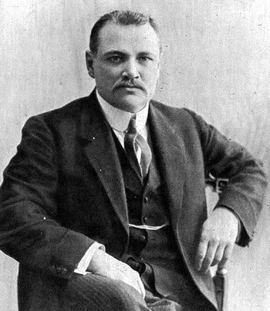Rostovtsev Mikhail (1870–1952) – specialist in classical culture and history, archeologist.
He was born in the family of a specialist in classical philology, a teacher at gymnasium, later – Actual Privy Council and Head of the Orenburg Educative District I. Ya. Rostovtsev. He learnt at classical gymnasium in Zhitomir and Kiev.
In 1888-1890, he studied at the Historical and Philological Faculty of the Kievan St Vladimir University; and when his father was transferred to Orenburg, R. went to the St. Petersburg University; he graduated from it in 1892. He stayed at the University to prepare himself for the Professor position; he went for a year to Italy at his own account. In 1892-1895, he taught at the Tsarskoselskaya Gymnasium. After passing his Master exams, he was sent abroad with a scholarship (1895-1896) for further training.
Since 1898, he was Ass. Docent of the Historical and Philological Faculty of the St. Petersburg University, and at the Bestuzhev High Female Courses. In 1899, he got his Master degree for the work on the farming system in Rome; and in 1903 – Doctor degree for the work on Roman tessera. Since 1910, he was Full Professor of the Historical and Philological Faculty of the St. Petersburg University.
Since 1908, he was Correspondent Member of the Ac. of Sc.; since 1917 – Academician. In 1914, he was elected for Academician of the Berlin Ac. of Sc., and in 1917 – Correspondent Member of British Royal Ac.
He was against Bolsheviks; in the summer 1918, R. left Russia under the pretext of an Academic trip abroad. Up to 1920, he lived in Oxford. In 1920-1925, he was Professor of the University Wisconsin (the U.S.A.); from 1925 till the end of his life, he worked at the Yale University (1925-1939 – Professor, since 1939 – Prof. Emeritus).
He was able to build a wholesome and logical picture of the history and culture of the North Black Sea coast. In the works o social and economical history of Hellenism and Roman Empire he constructed a new perspective for the classical society, city one – first of all; it was necessary background for any research in the field of classical religion. An expedition under the supervision of R. made the biggest input into the excavations of Dura-Europos.

